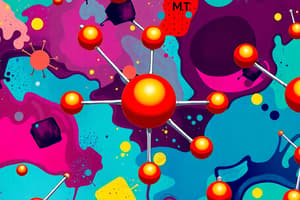Podcast
Questions and Answers
What is the primary focus of inorganic chemistry?
What is the primary focus of inorganic chemistry?
- Compounds made up of carbon and hydrogen only
- Compounds made up of metals only
- Compounds made up of elements from organic groups
- Molecules composed only of elements from chemical groups other than organic ones (correct)
Who first coined the term 'inorganic' and what was the original scope?
Who first coined the term 'inorganic' and what was the original scope?
- Robert Boyle, to describe all matter except living organisms
- Justus von Liebig, to describe all matter except living organisms (correct)
- Justus von Liebig, to describe living organisms
- Robert Boyle, to describe living organisms
Which type of bonding involves metal atoms surrounded by ligands like halogens or oxygen?
Which type of bonding involves metal atoms surrounded by ligands like halogens or oxygen?
- Covalent bonding
- Coordination complexes (correct)
- Ionic bonding
- Electronegativity bonding
What type of bonding occurs between neutral atoms in inorganic chemistry?
What type of bonding occurs between neutral atoms in inorganic chemistry?
Which area falls under the study of inorganic chemistry related to transfer of electrons between species?
Which area falls under the study of inorganic chemistry related to transfer of electrons between species?
In addition to semiconductors and solar cells, what other materials science field is covered by inorganic chemistry?
In addition to semiconductors and solar cells, what other materials science field is covered by inorganic chemistry?
Flashcards are hidden until you start studying
Study Notes
Inorganic Chemistry is one of two main branches of chemistry, which deals with the study of molecules composed only of elements from chemical groups other than organic ones. This includes compounds made up entirely of metals, nonmetals, and metalloids, as well as those containing carbon along with another element such as hydrogen.
The term 'inorganic' was first coined by Justus von Liebig in 1839, who used it to describe all matter except living organisms. However, this definition has since broadened to encompass any substance that does not come under the scope of organic chemistry. There are several fundamental concepts within inorganic chemistry that you may encounter when studying the subject. For instance, you might learn about coordination complexes, which involve metal atoms surrounded by ligands, like halogens, oxygen, and chlorine; ionic bonding between charged particles; covalent bonding occurring between neutral atoms; electronegativity differences affecting how much energy a compound requires to gain or lose an electron; and redox reactions involving the transfer of electrons between different species. The field also covers various types of materials science, including semiconductors, superconductivity, solar cells, liquid crystals, piezoelectricity, ferroelectrics, thermoelectrics, and pigments.
In addition to these core aspects, inorganic chemists often work with minerals and their properties, particularly in geochemical processes. They also explore the behavior of gases, liquids, solids, and plasmas in high temperatures, pressures, and magnetic fields. Furthermore, they delve into nuclear materials and radiation effects, and are involved in developing new polymers and catalysts for industry. As such, inorganic chemistry takes place across diverse settings ranging from space exploration to environmental issues, pharmaceuticals, nanomaterials, and even forensics. With its vast applications in everyday life, it's clear why so many students choose to pursue further education in this dynamic discipline.
Studying That Suits You
Use AI to generate personalized quizzes and flashcards to suit your learning preferences.




